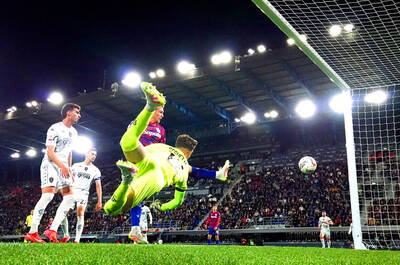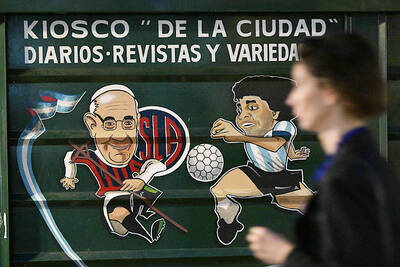With the World Cup finals in South Africa only a few months away, World Cup fever is picking up around the globe.
Even in Taiwan the event will attract a devout following, but contemplating the day when the national team actually makes it to soccer’s biggest event is an entirely different story.
Local soccer experts agree that funding, culture and a proper structure are the keys to developing the sport in Taiwan, where the game has long struggled to gain a foothold.
The foremost goal is to create a “soccer culture,” which has been nonexistent in a nation far more passionate about basketball and baseball, said Lin De-jia, secretary-general of the Chinese Taipei Football Association (CTFA).
Without a professional league and a soccer culture, children don’t have the motivation to participate in the sport, Lin said.
It’s not a secret that Taiwan, currently ranked 162nd in the world, has long been an international soccer minnow, registering five wins, five draws and 41 losses in World Cup qualifying matches from 1958 to this year. The team has scored only 28 goals in those games, while surrendering 182.
Led by Japanese head coach Toshiaki Imai, Taiwan’s World Cup qualifying campaign for this year’s finals quickly evaporated in October 2007 when Uzbekistan defeated them by an aggregate 11-0 scoreline.
In order to change its lowly status, Taiwan needs to focus on developing its youth soccer programs, said Frenchman David Camhi, who is familiar with Taiwanese soccer and has been running a training camp for children in Taipei with some friends for six years.
All training and competitions take place within the education system, based on the US model, as was the case in Japan in the late 1980s and early 1990s, Camhi wrote in Kick-Off magazine, and he argues it is the wrong approach.
“Japan now has three professional leagues, nine regional leagues, 46 prefecture leagues and many more municipal leagues. A football pyramid with eight levels,” Camhi wrote.
With such a structure in place, Japan managed within approximately 12 years to progress to the second round of the FIFA World Cup finals in 2002 and to qualify in 2006 and this year.
“It’s something the football authorities and other sporting bodies in Taiwan should look into,” he wrote.
When there is a much larger talent pool, the overall competitive level of the sport will be elevated, said Camhi, who arrived in Taiwan in 1999 and has been working on promoting and teaching the game to children since that time.
Other than the lack of a professional league, funding has also been a problem, Lin said.
“Taiwan’s government sees the CTFA as nothing more than one of more than 60 sports associations in the country,” he said.
Lin said the association previously received NT$10 million (US$312,000) in funding from the government each year, but that amount dropped to NT$6 million last year. That’s a pittance compared with the NT$30 million the CTFA spends to send teams, ranging from under-13 to the senior level, abroad to play in 20 to 30 international competitions each year, Lin said.
He does acknowledge that there have been some sparks of interest over the past decade, including after the 2002 World Cup in Japan and South Korea when Taiwanese passion for soccer did pick up a little.
Since then, Lin said, more schoolchildren have participated and more schools have organized teams, enabling the nation’s youth teams to fare better in competitions.
Camhi said a number of elite young Taiwanese players are even capable of playing professionally now, though because they lack exposure they are not recruited by European or South American clubs.
Both Lin and Camhi acknowledge that the development of the local game will take a long time and requires patience.
Lin urged the government to plan for the long-term rather than rush for immediate results and he urged officials to rethink their policy of establishing “sports classes” — which gather the best athletes into a single class — because it works against achieving the long-term objective.
Such classes actually limit participation in sports and discourages schools without sports classes from organizing teams because they cannot compete with the better schools, he argued.
That’s not good because the future is the younger generation, Camhi said. Only by working from the bottom up can Taiwan improve its performance and some day “reach my ultimate goal for Taiwan — to qualify for the World Cup,” he said.

Bologna on Thursday advanced past Empoli to reach their first Coppa Italia final in more than half a century. Thijs Dallinga’s 87th-minute header earned Bologna a 2-1 win and his side advanced 5-1 on aggregate. Giovanni Fabbian opened the scoring for Bologna with a header seven minutes in. Then Viktor Kovalenko equalized for Empoli in the 30th minute by turning in a rebound to finish off a counterattack. Bologna won the first leg 3-0. In the May 14 final in Rome, Bologna are to face AC Milan, who eliminated city rivals Inter 4-1 on aggregate following a 3-0 win on Wednesday. Bologna last reached the

If the Wild finally break through and win their first playoff series in a decade, Minnesota’s top line likely will be the reason. They were all over the Golden Knights through the first two games of their NHL Western Conference quarter-finals series, which was 1-1 going back to Minnesota for Game 3 today. The Wild tied the series with a 5-2 win on Tuesday. Matt Boldy had three goals and an assist in the first two games, while Kirill Kaprizov produced two goals and three assists. Joel Eriksson Ek, who centers the line, has yet to get on the scoresheet. “I think the biggest

From a commemorative jersey to a stadium in his name, Argentine soccer organizers are planning a slew of tributes to their late “Captain” Pope Francis, eulogized as the ultimate team player. Tributes to the Argentine pontiff, a lifelong lover of the game, who died on Monday at the age of 88, have been peppered with soccer metaphors in his homeland. “Francisco. What a player,” the Argentine Football Federation (AFA) said, describing the first pope from Latin America and the southern hemisphere as a generational talent who “never hogged the ball” and who showed the world “the importance of having an Argentine captain,

Noelvi Marte on Sunday had seven RBIs and hit his first career grand slam with a drive off infielder Jorge Mateo, while Austin Wynn had a career-high six RBIs as the Cincinnati Reds scored their most runs in 26 years in a 24-2 rout of the Baltimore Orioles. Marte finished with five hits, including his eighth-inning homer off Mateo. Wynn hit a three-run homer in the ninth off catcher Gary Sanchez. Cincinnati scored its most runs since a 24-12 win against the Colorado Rockies on May 19, 1999, and finished with 25 hits. Baltimore allowed its most runs since a 30-3 loss to